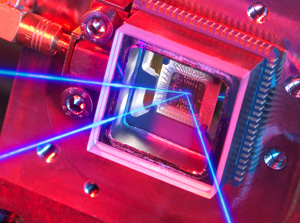Nov 27 2014
A new national network of Quantum Technology Hubs, that will explore the properties of quantum mechanics and how they can be harnessed for use in technology, has been unveiled today by Greg Clark, Minister of State for Universities, Science and Cities.
 Ion trap
Ion trap
As part of the UK National Quantum Technologies Programme (UKNQT), the National Physical Laboratory (NPL) will also establish a Quantum Metrology Institute (QMI) at its Teddington site. This new Institute will cover all of NPL's leading-edge quantum science and metrology research and provide the expertise and facilities needed for academia and industry to test, validate, and ultimately commercialise new quantum research and technologies. By bringing together industry engineers, academic researchers, and NPL scientists in a highly collaborative environment, the QMI will play a key role in the creation of a UK industry based on quantum technologies.
The QMI will be linked to the four new hubs at the universities of Birmingham, Glasgow, Oxford and York, selected after a competitive peer-reviewed process. The hubs will be funded by the Engineering and Physical Sciences Research Council (EPSRC) from the £270 million investment in the UKNQT announced by the Chancellor, George Osborne in his Autumn Statement of 2013. This investment, which is also providing £4 million towards the QMI, is designed to ensure the successful transition of quantum technologies from laboratory to industry. The programme is delivered by EPSRC, Innovate UK, the Department for Business, Innovation & Skills (BIS), NPL, GCHQ, the Defence Science and Technology Laboratory (Dstl) and the KTN.
Quantum metrology at NPL will play a key role in bridging the gap between quantum science and commercial exploitation, for example in developing compact atomic clocks to deliver precision timekeeping in communications.
NPL is one of the world's leading measurement laboratories and is continually developing new capabilities through fundamental and applied research programmes. NPL has a long history in quantum science going back to the successful operation of the world's first atomic clock 50 years ago. More recently, NPL demonstrated the highest-accuracy quantum standards for resistance and current. Work at NPL now covers the latest generation of optical atomic clocks and highly stable laser systems, quantum electrical metrology, a range of quantum-based sensors, quantum communications, and quantum materials including graphene. Quantum metrology research is also under way to establish a new SI system of units based on the fundamental physical constants.
The QMI will build upon NPL's proven ability to provide measurement support that underpins quantum research and accelerate the process of commercialisation. For example, NPL recently worked with Toshiba Research Europe and BT on the first successful trial of Quantum Key Distribution (QKD) technology over a live 'lit' fibre network. This work paved the way for more advanced research into QKD, the next frontier of data encryption technology. Prior to the trial NPL developed a series of measurements sensitive enough to detect individual particles of light (photons), which it used to independently verify the security of the system.
The QMI will be a centre for collaboration and will welcome an increasing number of postgraduate researchers and other university staff onto the Teddington site. Students will work on research projects alongside NPL science teams, training a new generation of quantum scientists and engineers. University researchers will also work on site bringing scientific experiments to NPL to use the unique facilities and precise standards available to accurately characterise and validate their developments.
Work has already begun on refurbishing and extending laboratories within NPL for future use in quantum technologies, with the aim being to formally open the QMI in late 2015. The new facility will include a range of new capital investments funded from a £4M capital budget for quantum technologies at NPL, announced as part of the overall government investment in the field. As the scope of engagement continues to expand, the Institute hopes to grow through additional investment from Government, Academia and Industry.
Professor Sir Peter Knight, Chair of the QMI at NPL and Past-president of the Institute of Physics (IOP), said: ''In the UK we have had incredible academic strength in quantum research, both at the universities and places like the National Physical Laboratory. The new initiative driven by government's £270M investment is to pull all this out of the laboratories and into practical realisations in the real world. NPL is pivotal to this - its new Quantum Metrology Institute will provide a critical test bed that accelerates the process of commercialising research. Through the QMI we can provide the measurement validation that helps prepare products for market and gives businesses and consumers complete confidence.''
Neil Stansfield, Head of Knowledge, Innovation, and Futures Enterprise at Dstl, said: ''In the twentieth century, exploitation of quantum mechanics brought about semiconductors, microprocessors, lasers, nuclear energy, thermal imagers and digital cameras, all of which provide countless benefits for society, as well as for the military. In order to replicate such successes with new quantum technologies, there is a need to commercialise the fruits of the UK's world-class academic community. NPL's new Quantum Metrology Institute will play a valuable role in this process by establishing standards and providing verification and validation - essential to the uptake of new technologies.''
David Delpy, Chairman of the Strategic Advisory Board for UK National Quantum Technology Programme, said: ''NPL will have a critical role to play across the lifetime of this programme, both within the field of metrology and beyond. Many of the new techniques will require very specialist measurement tools, and NPL's new Quantum Metrology Institute will provide crucial resources to help support the whole network. This work is already happening through its role in quantum atomic time and its support to the Dstl.''